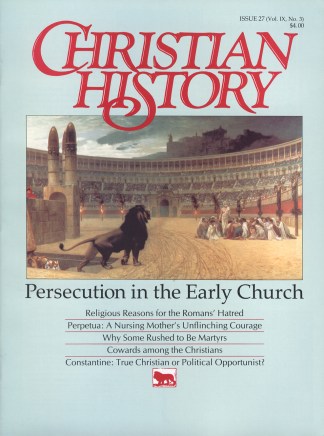Just as Jesus and the apostles were victims of the overarching and exclusive religious system that they threatened, so those who followed them suffered for similar reasons. (In fact, it may be true that all persecutions are conducted from the background of a comprehensive world view, such as pantheism or Marxism, that people are found to be transgressing.)
The first century was a time of religious and ethical ferment. Some of the older religious beliefs that had fallen into disuse enjoyed a revival, and newer ones, like the worship of Isis and Mithra (mystery religions), came into vogue.
Charitable foundations, guilds, and endowments for the benefit of hospitals and schools came into being, and the harsher elements of slave ownership were mitigated by reforms. Some of this ethical reform may have come from the cultural influence of Judaism, even as its political influence was being crushed.
This strengthening of the religious impulse in the first century, of course, had nothing to do with the worship of the one true God. Religious sensibility was dominated by fear of the unknown, and the gods had to be propitiated with occult rites and ceremonies. A demonology developed and people relied on dreams and omens. Chaldean astrology made a comeback.
The Unifying Imperial Cult
Superimposed upon this variety of religious expression was the imperial cult, which provided a surface uniformity over the diversity of the Empire and was intended to cement political authority. In the context of an official freedom of worship, the requirement that incense be offered to the emperor presented no problem to the multitude of pagan religions. But it was disastrous for the Christians.
Given the dominance of the imperial cult, it was inevitable that Christians should come into conflict with the state. Central to the very existence of the church was the conviction that Christ was Lord of all. This relativized all other loyalties, including political ones. Even though the Christians might insist they were aloof from politics, they held to a source of law higher than the emperor, and therefore perennially endangered a system that was absolutist. As one historian expressed it “ … the rise of the ‘slaves of Christ’ meant the fall of the rule of the Caesars.”
Sometimes religious zeal motivated the pagans, and they thought they were serving their gods when participating in the persecutions. One of the most famous of the early Christians, Tertullian, put it this way: “If the Tiber floods the city, or the Nile refuses to rise, or the sky withholds its rains, if there is an earthquake, famine, or pestilence, at once the cry is raised: ‘Christians to the lions!’”
Dr. Herbert Schlossberg, Project Director, Fieldstead Institute.
Copyright © 1990 by the author or Christianity Today/Christian History magazine.Click here for reprint information on Christian History.










